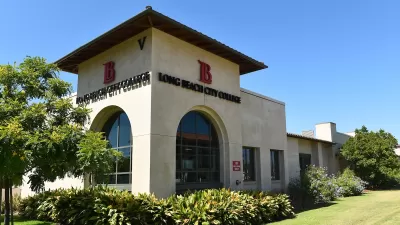A new report argues that city governments have some of the same incentives for de-emphasizing single-occupant commuters as colleges—such as attracting younger workers and freeing up land used for parking.
A new report by Frontier Group and the U.S. Public Interest Research Group Education Fund gathers numerous case studies of universities around the country that have increased multi-modal ride share on and around campus.
The premise of the study is that colleges and cities have many of the same reasons for reducing single-occupant car trips, according to an article by J.B. Wogan describing the report.
Wogan cites the case of Palo Alto, which is trying to reduce single-occupant car trips by at least 30 percent: “the city is likely to borrow ideas from nearby Stanford University, which successfully reduced solo driving by offering ‘a fleet of about 60 shuttle buses, free Caltrain passes, and cash incentives through the Commute Club, whose 8,000 members shun solo driving.’”
The report also cites examples from the University of Madison-Wisconsin, the University of Dayton, the University of Colorado, Boulder, and the University of California, Davis.
FULL STORY: What Government Can Learn from Colleges about Transportation Policy

Alabama: Trump Terminates Settlements for Black Communities Harmed By Raw Sewage
Trump deemed the landmark civil rights agreement “illegal DEI and environmental justice policy.”

Planetizen Federal Action Tracker
A weekly monitor of how Trump’s orders and actions are impacting planners and planning in America.

The 120 Year Old Tiny Home Villages That Sheltered San Francisco’s Earthquake Refugees
More than a century ago, San Francisco mobilized to house thousands of residents displaced by the 1906 earthquake. Could their strategy offer a model for the present?

In Both Crashes and Crime, Public Transportation is Far Safer than Driving
Contrary to popular assumptions, public transportation has far lower crash and crime rates than automobile travel. For safer communities, improve and encourage transit travel.

Report: Zoning Reforms Should Complement Nashville’s Ambitious Transit Plan
Without reform, restrictive zoning codes will limit the impact of the city’s planned transit expansion and could exclude some of the residents who depend on transit the most.

Judge Orders Release of Frozen IRA, IIJA Funding
The decision is a victory for environmental groups who charged that freezing funds for critical infrastructure and disaster response programs caused “real and irreparable harm” to communities.
Urban Design for Planners 1: Software Tools
This six-course series explores essential urban design concepts using open source software and equips planners with the tools they need to participate fully in the urban design process.
Planning for Universal Design
Learn the tools for implementing Universal Design in planning regulations.
Clanton & Associates, Inc.
Jessamine County Fiscal Court
Institute for Housing and Urban Development Studies (IHS)
City of Grandview
Harvard GSD Executive Education
Toledo-Lucas County Plan Commissions
Salt Lake City
NYU Wagner Graduate School of Public Service





























